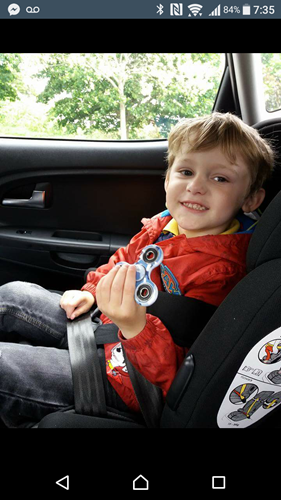How do I… meet the needs of my child and help others to meet them as well?
Parents offer their advice on how they help meet their child’s needs and also give tips on how they make sure their child’s needs are met in school, out with friends or in everyday situations.
I use visual clues...

Emmett
Adrian is dad to Emmett (4) who is profoundly deaf and wears cochlear implants.
"We generally work on words and signs with Emmett through the week and then advise his teachers and wider family of the words or signs he’s beginning to learn or pick up. It takes two minutes to pass these on.
Although his communication is coming on brilliantly, with him using British Sign Language (BSL) and speech, we aim to try and make it as easy as possible for him to be involved and communicate in every way.
When we’re going out anywhere Emmett can get quite flustered. We use a photo plan for his day to help him understand what we’re doing. I take photos of his clothes (time to dress), then a photo of a taxi (we are going out), a photo of where we are going, etc. We also started taking a series of screenshots on our phone, for example, a picture of our local shopping centre lets him know shops are involved.
We do this for most trips or activities like swimming and going to the cinema, and all of them are accompanied with the sign and the word. It makes the world of difference to him, his confidence has soared, and he is no longer throwing tantrums where he just couldn’t be involved because of the communication barrier.
It’s been a long road but entirely worth it: visual cues, BSL, taking an extra 30 seconds, repeating the words – it all helps and makes a difference."
I find openness is the best policy...
Louise is mum to Ed (11) who is moderately to severely deaf.
"It’s a bit like walking a tightrope – as the parents of a moderately to severely deaf child we’ve never wanted Ed to be labelled as ‘disabled’ but he does face challenges fully hearing children might not be aware of.
Over the years we’ve found that it’s important to explain our current understanding of how his deafness affects him. We’ve found that being open about Ed’s deafness is always the best policy – Ed himself likes people to know he’s deaf.
Recently he was invited to a sleepover birthday party by a new school friend and I openly provided the parents with information about his deafness. The boys were camping outside in the garden and I explained to the parents that when Ed takes his aids out he is really deaf and won’t respond unless the person talking is facing him and he can partly lip-read. I also explained that because of his deafness Ed can be anxious when he goes to bed (and is frightened of the dark).
I also think it’s important to discuss the other educational problems caused by deafness. Ed has always been slower at grasping English and spelling, which goes back to him struggling with quiet word sounds. It’s important to make sure the special educational needs coordinators (SENCOs) at the school are aware.
Usually this would be in conjunction with their Teacher of the Deaf but we don’t have one. I have regular meetings with the SENCOs and we discuss how best we can support Ed’s learning in his weaker areas – he is good at learning facts but struggles with complex vocabulary, which then disadvantages him when reading exam papers."
I remind him he needs to speak up...

Kevin
Christina is mum to Kevin (17) who is moderately deaf and wears hearing aids.
"When Kevin started primary school I wrote to the SENCO and new class teacher at the beginning of every school year explaining he needed to sit at the front to be able to lip-read. I also gave him a copy of the letter so he could show it to other teachers if necessary.
If he was still unable to hear in class he’d ask the teacher to repeat or ask a student sitting next to him to help. I kept reminding him that he needed to speak up if he couldn’t hear or lip-read. I also wrote to the SENCO before the end of term exams to ensure Kevin would be seated appropriately in the exam hall."
I help her feel positive about her deafness...

Florence
Sharon is mum to Florence (18) who is profoundly deaf.
"As a parent you can encourage your child, but ultimately it has to come from them. When they are younger it’s easier as the parent takes the initiative to tell others. As Florence got older we’ve always highlighted the importance of making other people aware of her deafness, but then left the decision to her. It’s taken a long time for her to be confident to do so and she still struggles at times.
Some useful approaches we’ve tried include time out from class with a group of friends to explain the importance of good communication. This was supported by the school and facilitated by her support assistant. At primary school she presented to the class and had a box of hearing equipment that the children could look at.
It’s everyday encounters which are most challenging now, for example, buying a train ticket in a noisy station. Sometimes Florence chooses to wear her hair up as this makes her hearing aid and implant more obvious without the need to say.
The most useful advice I can give is to help your child feel positive about their deafness and abilities."
